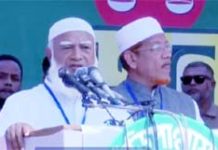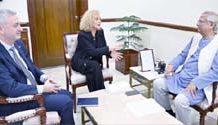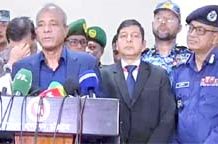C T Online Desk: Prime Minister Sheikh Hasina’s daughter, Saima Wazed, who is globally famed for her role as a mental health expert—particularly autism—is contesting for the post of the World Health Organization’s regional director for Southeast Asia.
Dr Shambhu Prasad Acharya, nominated by Nepal, is the other candidate, according to the UN health agency. Saima Wazed also announced her candidacy on X, formerly Twitter.
WHO Director-General Dr Tedros Adhanom Ghebreyesus sent the names of the candidates for the election of the next Regional Director to the relevant Member States on August 18.
Bangladesh, Bhutan, DPR Korea, India, Indonesia, the Maldives, Myanmar, Nepal, Sri Lanka, Thailand, and Timor-Leste are the 11 members of the region.
Dr Poonam Khetrapal Singh of India is the current regional director.
Once elected, Saima Wazed will be the first Bangladeshi to hold the post created in 1948 as part of WHO’s regional divisions.
The election process
The Regional Committee of the WHO South-East Asia Region will vote to nominate the next Regional Director in a closed meeting during its seventy-sixth session in New Delhi from October 30 to November 2, according to the WHO.
The nomination will then be submitted for appointment by the 154th session of the WHO Executive Board, which takes place from January 22–27, 2024 in Geneva, Switzerland.
The newly-appointed Regional Director will take office on February 1, 2024, for a five-year term and be eligible for reappointment once.
Working with 194 Member States across six regions, WHO is the United Nations specialized agency responsible for directing and coordinating international health work. The Regional Director is the head of the regional office.
The Regional Committee is composed of the Member States of the Region and meets annually to agree on health actions and chart priorities for the work of WHO in the Region.
The WHO South-East Asia Region is home to over 2 billion people, or a quarter of the world’s population.
Who is Saima Wazed?
Saima Wazed drew attention to the people in Bangladesh and the world, not just as the daughter of the prime minister and the granddaughter of the Father of the Nation, Bangabandhu Sheikh Mujibur Rahman.
She spearheaded the campaign for autism awareness in Bangladesh at a time when parents used to hide their children with this neurodevelopmental disorder due to the social stigma attached to the disease.
She is a licensed school psychologist in the US and a faculty member of the Adrian Dominican School of Education (ADSOE) at Barry University, USA.
She led a South Asia regional meeting in Dhaka on autism in July 2011, bringing together regional and global experts and leaders, including then India’s Congress Party President Sonia Gandhi, Sri Lankan first lady Shiranthi Rajapaksa, and the wife of the vice president of the Maldives, Ilham Hussain.
After that, Bangladesh’s National Advisory Committee on Autism and Neuro-developmental Disorders and Global Autism Public Health Initiative were established under her chairmanship.
“It’s because of her that we could make a place for our children in society. It’s hard to explain how grateful we are to her,” Sajida Rahman Danny, founder president of the Parents Forum for Differently Able, told Dhaka Tribune on Thursday.
It is due to Saima Wazed that WHO adopted several resolutions for the welfare of children with autism. The WHO SEARO in 2014 recognised her contribution with the “WHO Excellence Award for Public Health”, by saying that she put autism on the WHO map.
In the citation note, the WHO said she played a “path-breaking” role in addressing autism at the national, regional, and global levels to ensure there is a national policy and commitment for autistic children.
She was also made an advisor to the Director General of the WHO on mental health and autism.
“I come from a well-known political family that most are familiar with and incorrectly assume that I have always lived a life of privilege. Despite being born in Bangladesh as the granddaughter of the Father of the Nation, my earliest memories were that of growing up in India as a refugee,” she said on her personal website.
Bangabandhu was assassinated on August 15, 1975, along with most of his family members. Sheikh Hasina survived, as she was abroad at the time. But she could not come home until 1981.
“Trauma, secrecy, and heightened concerns with security while always being aware I was not like everyone else were second nature to me,” Saima Wazed said.
Her vision for the region
Announcing her candidacy, Saima Wazed set three visions. Firstly, strengthening the ability of the member states and WHO to address health gaps in the context of current realities and foreseen and unforeseen challenges.
The second is to empower marginalized and vulnerable groups to ensure that they are not further disenfranchised.
The third is to enable countries in the WHO Southeast Asia region to implement equitable health by improving or creating effective and innovative local solutions.
Election campaign
Saima Wazed will accompany President Mohammed Shahabuddin during his upcoming visit to Indonesia to attend an Asean summit on September 5-7.
During the visit, the president will meet his counterparts and heads of state of different countries who are also members of the WHO SEARO.
Those meetings would be helpful for Bangladesh’s campaign for the regional director’s post, Foreign Minister Dr AK Abdul Momen said at a press briefing on Thursday.
















